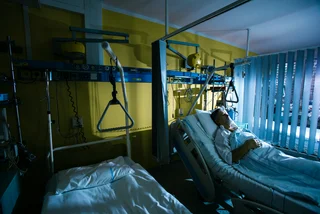Relaxing the anti-epidemic rules is not a good idea due to the current epidemic situation in Czech Republic, but opinions on reopening shops next week are split in the government, Prime Minister Andrej Babiš told reporters in the Chamber of Deputies today. The government will decide the issue on Friday.
Industry and Trade Minister Karel Havlíček, who is also deputy prime minister, has proposed that the government reopen retail shops as of Feb. 22, with shop employees wearing respirators, while the public would only have to use face coverings. The current rules of 15 square meters per client, a two-meter distance between them, and monitoring lines outside shops will be still apply.
“The opening of retail stores is a significant shift. It’s a big psychological break. After a long time, people will see the light at the end of the tunnel; we will play it slowly, and if we manage to do it, it is a great signal that we will be able to continue. I am convinced that we can do it together,” Havlíček tweeted on Feb. 16.
OtevÅ™enà maloobchodů je výrazný posun. Je to velký psychologický zlom. Lidé po delÅ¡Ã dobÄ› uvidà svÄ›tlo na konci tunelu, pouÅ¡tÃme to pozvolna a pokud to zvládneme, je to velký signál, že budeme moci pokraÄovat. Jsem pÅ™esvÄ›dÄen, že to spoleÄnÄ› zvládneme. https://t.co/5hc40W6MuN
— Karel HavlÃÄek (@KarelHavlicek_) February 16, 2021
"The government does not have a homogenous opinion on it," Babiš said.
Babiš added he has not made up his mind yet, and would listen to propositions of other ministers first.
“The situation is obviously bad. If 50 percent of people do not respect the measures, it is a complicated situation. But I think this is not a situation for us to relax, it is not a good idea,” he added.
Education Minister Robert Plaga tweeted that if children's return to schools was a real priority, then a relaxation would be impossible.
Pokud je návrat žáků do Å¡kol skuteÄnou prioritou nejen pro @msmtcr, tak jiné zmÄ›ny opatÅ™enà (napÅ™. otevÅ™enà obchodů) nejsou možné a zvýšenà sociálnÃch kontaktů pÅ™i návratu do Å¡kol musà být vyváženo povinným testovánÃm ve výrobnÃch firmách a maximálnÃm využÃvánÃm home office.
— Robert Plaga (@RobertPlaga) February 18, 2021
“If the return of pupils to schools is a real priority not only for Education Ministry, other changes to the measures (for example opening shops) are not possible, and the increase in social contacts when returning to schools must be balanced by mandatory testing in manufacturing companies and maximum use of the home office,” Plaga said.
Deputy Prime Minister and Interior Minister Jan Hamáček was also skeptical about reopening shops. “I am convinced that a situation when the numbers of the infected keep rising and our intensive care units are completely full is not the right moment for relaxation,” he told reporters.
Babiš’s aide, former health minister Roman Prymula, told Czech Telvision he would suggest to Babiš that there be two or three weeks of strict measures before any relaxation of rules.
“Should I proceed regardless of politics and purely epidemiologically, I would take the part of a short lockdown and following relaxation on condition of testing,” he said, adding that it was too late to appeal to people to behave responsibly.
Retail shops, except for those selling essential goods, are closed due the Czech Republic being on the fifth and highest level of the PES anti-epidemic scale. Shops have been closed since Dec. 27, 2020. Shops that are allowed to be open, such as supermarkets, can only sell essential goods so as not to take unfair advantage of the shops that are closed. Stationery stores and shops with children’s clothes and shoes were allowed to reopen Jan. 19.
COVID 19 is spreading fast in the Czech Republic due to the more infectious British virus mutation, and hospitals are running out of beds at intensive care units. There is a risk that the hospital capacity will be depleted in eight out of the 14 regions, Institute of Health Information and Statistics (ÚZIS) director Ladislav Dušek said.
Laboratories in the Liberec region this week reported that up to 70 percent of COVID infections were the British variant, and the labs in Hradec Králové region found it in about two-thirds of the samples.
On Feb. 17, a record high number of 1,227 COVID-19 patients in a serious condition were in Czech hospitals.












 Reading time: 3 minutes
Reading time: 3 minutes 





 English
(Advanced)
English
(Advanced)






















